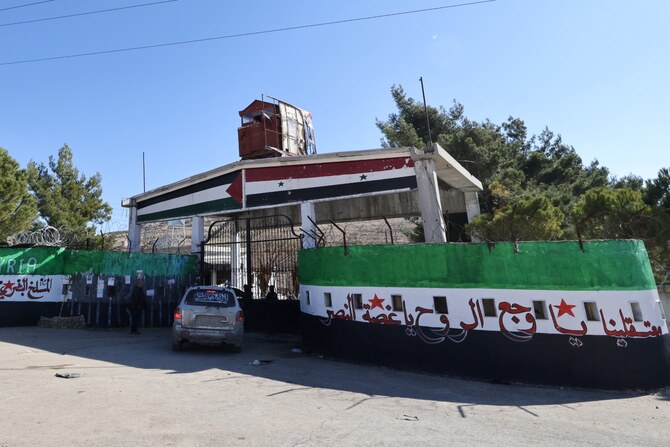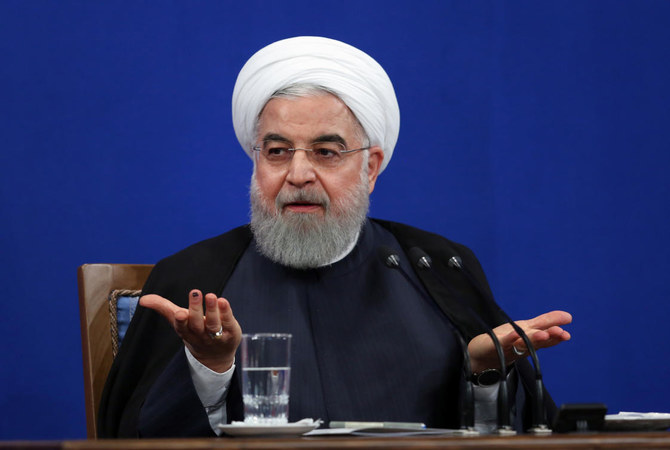TEHRAN: President Hassan Rouhani said Tuesday that Iran would resume uranium enrichment at an underground plant south of Tehran in its latest step back from a troubled 2015 agreement with major powers.
The suspension of all enrichment at the Fordow plant in the mountains near Qom was one of the restrictions on its nuclear activities that Iran accepted in return for the lifting of international sanctions.
But Washington’s abandonment of the deal in May last year followed by its reimposition of crippling sanctions prompted Iran to begin a phased suspension of its own commitments in May this year.
Under the terms of the agreement Iran has retained more than 1,000 first-generation centrifuges at the plant which have been running empty or remained idle since it took effect.
“Starting from tomorrow (Wednesday), we will begin injecting (uranium hexafluoride) gas at Fordow,” Rouhani said in a speech broadcast by state television.
His announcement came a day after tensions flared anew on the 40th anniversary of the US embassy siege and hostage crisis, with thousands in Tehran taking to the streets and Washington imposing fresh sanctions.
Iran said the resumption of enrichment at Fordow would be carried out transparently and witnessed by inspectors from the UN nuclear watchdog, the International Atomic Energy Agency.
But the European Union voiced disquiet at the new step away from the 2015 deal.
“We are concerned by President Rouhani’s announcement today to further reduce Iran’s commitments,” EU spokeswoman Maja Kocijancic told reporters.
France urged Iran to “go back on its decisions which contradict the accord.”
And Russia too expressed worry, despite its good relations with Iran.
“We are monitoring the development of the situation with concern,” President Vladimir Putin’s spokesman Dmitry Peskov told reporters.
“We support the preservation of this deal.”
At the same time, Peskov said Moscow understood Tehran’s concerns over the “unprecedented and illegal sanctions” imposed by Washington.
The move is the fourth announced by Iran since it began responding to Washington’s abandonment of its commitments.
Iran has repeatedly warned the remaining parties to the deal — Britain, China, France, Germany and Russia — that the agreement can only be rescued if they help it circumvent US sanctions.
European governments have strived to come up with a mechanism that would allow foreign firms to continue to do business with Iran without incurring US penalties.
But to Iran’s mounting frustration, their efforts have so far failed to have any significant impact.
Rouhani stressed that Iran remained committed to efforts to save the 2015 agreement despite its phased suspension of some of its commitments.
“The fourth phase, like the three previous ones, is reversible,” he said.
“We are committed to all the behind-the-scenes negotiations we have with some countries for a solution.
“Over the next two months, we will negotiate more.”
Rouhani said Iran wanted to return to a situation in which “we can easily sell our oil, we can easily use our money in banks.”
If that were achieved, “we will completely go back to the previous situation.”
The European Union warned Monday that its continued support for the deal depended on Tehran fulfilling its commitments.
Its spokeswoman said the bloc “remains committed” to the deal but “our commitment... depends on full compliance by Iran.”
“We have continued to urge Iran to reverse such steps without delay and to refrain from other measures that would undermine the nuclear deal,” Kocijancic said.
On July 1, Iran said it had increased its stockpile of enriched uranium to beyond a 300-kilo maximum set by the deal, and a week later, it announced it had exceeded a 3.67-percent cap on the purity of its uranium stocks.
On September 7, it fired up advanced centrifuges to boost its enriched uranium stockpiles.
On Monday, Iran announced a more than tenfold increase in enriched uranium production as a result of the steps back from the nuclear deal it had already undertaken.
Enriched uranium production has reached five kilogrammes per day, Ali Akbar Salehi, the head of Iran’s Atomic Energy Organization, told reporters.
That compares with the level of 450 grams two months ago.
Iranian president announces another break from nuclear deal
Iranian president announces another break from nuclear deal

- President Hassan Rouhani made the statement in an address carried live by Iranian state TV on Tuesday
- Under Iran’s 2015 nuclear deal, the machines are supposed to spin without gas injection
UNRWA chief vows to continue aid to Palestinians despite Israeli ban

OSLO: The UN’s Palestinian refugee agency UNRWA will continue to provide aid to people in the Palestinian territories despite an Israeli ban due to be implemented by the end of January, its director said Wednesday.
“We will ... stay and deliver,” UNRWA chief Philippe Lazzarini told a conference in Oslo. “UNRWA’s local staff will remain and continue to provide emergency assistance and where possible, education and primary health care,” he said.
Erdogan says Turkiye can ‘crush’ all terrorists in Syria

ANKARA: Turkish President Tayyip Erdogan on Wednesday urged all countries to “take their hands off” Syria and said Turkiye had the capacity and ability to crush all terrorist organizations in the country, including Kurdish militia and Islamic State.
Speaking in parliament, Erdogan said the Kurdish YPG militia was the biggest problem in Syria now after the ousting of former President Bashar Assad, and added that the group would not be able to escape its inevitable end unless it lays down its arms.
World must keep pressure on Israel after Gaza truce: Palestinian PM

OSLO: The international community will have to maintain pressure on Israel after an hoped-for ceasefire in Gaza so it accepts the creation of a Palestinian state, Palestinian Prime Minister Mohammed Mustafa said on Wednesday.
A ceasefire agreement appears close following a recent round of indirect talks between Israel and Hamas, with US Secretary of State Antony Blinken saying late Tuesday that a deal to end the 15-month war was “on the brink.”
“The ceasefire we’re talking about ... came about primarily because of international pressure. So pressure does pay off,” Mustafa said before a conference in Oslo.
Israel must “be shown what’s right and what’s wrong, and that the veto power on peace and statehood for Palestinians will not be accepted and tolerated any longer,” he told reporters.
He was speaking at the start of the third meeting of the Global Alliance for the Implementation of the Two-State Solution to the Israeli-Palestinian Conflict, gathering representatives from some 80 states and organizations in Oslo.
Norwegian Foreign Minister Espen Barth Eide, the host of the meeting, said a “ceasefire is the prerequisite for peace, but it is not peace.”
“We need to move forward now toward a two-state solution. And since one of the two states exists, which is Israel, we need to build the other state, which is Palestine,” he added.
According to analysts, the two-state solution appears more remote than ever.
Prime Minister Benjamin Netanyahu, firmly supported by US President-elect Donald Trump, is opposed to the creation of a Palestinian state.
Israel is not represented at the Oslo meeting.
Norway angered Israel when it recognized the Palestinian state, together with Spain and Ireland, last May, a move later followed by Slovenia.
In a nod to history, Wednesday’s meeting was held in the Oslo City Hall, where Yasser Arafat, Yitzhak Rabin and Shimon Peres received the Nobel Peace Prize in 1994.
The then-head of the Palestinian Liberation Organization, Israeli prime minister and his foreign minister were honored for signing the Oslo accords a year earlier, which laid the foundation for Palestinian autonomy with the goal of an independent state.
Syrians in uproar after volunteers paint over prison walls

DAMASCUS: Families of missing persons have urged Syria’s new authorities to protect evidence of crimes under president Bashar Assad, after outrage over volunteers painting over etchings on walls inside a former jail.
Thousands poured out of prisons after Islamist-led rebels toppled Assad last month, but many Syrians are still looking for traces of tens of thousands of relatives and friends who went missing.
In the chaos following his ouster, with journalists and families rushing to detention centers, official documents have been left unprotected, with some even looted or destroyed.
Rights groups have stressed the urgent need to preserve “evidence of atrocities,” which includes writings left by detainees on the walls of their cells.
But a video appearing to show young volunteers paint over such writings at an unnamed detention center with white paint and adorning its walls with the new Syrian flag, the depiction of a fireplace or broken chains has circulated on social media in recent days, angering activists.
“Painting the walls of security branches is disgraceful, especially before the start of new investigations into human rights violations” there, said Diab Serriya, a co-founder of Association of Detainees and Missing Persons of Saydnaya Prison (ADMSP).
It is “an attempt to destroy the signs of torture or enforced disappearance and hampers efforts to... gather evidence,” he said.
Jomana Hasan Shtiwy, a Syrian held in three different facilities under Assad, often changing cells, said the writings on the walls held invaluable information.
“On the walls are names and telephone numbers to contact relatives and inform them about the fate of their children,” she said on Facebook.
In each new cell, “we would write a memory so that those who followed could remember us,” she said.
A petition appeared on Tuesday calling for the new Syrian authorities to better protect evidence, and give investigating the fate of those forcibly disappeared under Assad “the highest priority.”
It slammed what it called “the insensitive treatment of the sanctity” of former detention centers.
“Some have gone as far as to paint cells, obscuring their features, which for us represents... a great wronging of detainees,” said signatories, including ADMSP.
The president of the International Committee for the Red Cross said last week determining the fate of those who went missing during Syria’s civil war would be a “huge challenge.”
Mirjana Spoljaric said the ICRC was following 43,000 cases, but that was probably just a fraction of the missing.
The Syrian Observatory for Human Rights, a Britain-based war monitor, says more than 100,000 people have died in detention from torture or dire health conditions across Syria since 2011.
Iran’s navy unveils its first signals intelligence ship

DUBAI: Iran’s navy received its first signals intelligence ship on Wednesday, semi-official Tasnim news organization reported, a few days after the country’s army took delivery of 1,000 new drones.
The Zagros is a new category of military vessel equipped with electronic sensors and the ability to intercept cyber-operations and conduct intelligence monitoring, Tasnim said.
“The Zagros signals intelligence ship will be the watchful eye of Iran’s navy in the seas and oceans,” Navy Commander Shahram Irani said.
Earlier this month, Iran started two-month-long military exercises which have already included war games in which the elite Revolutionary Guards defended key nuclear installations in Natanz against mock attacks by missiles and drones.
The military drills and procurement come at a time of high tensions with arch-enemy Israel and the United States under incoming US president Donald Trump.
In October, the spokesperson of Iran’s government said the country plans to raise its military budget by around 200 percent to face growing threats.
















